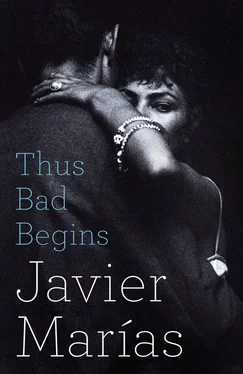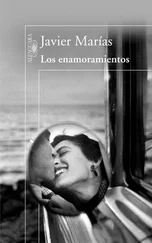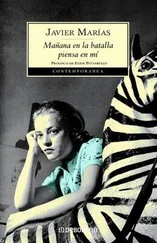There was a long silence, as if Beatriz were thinking or hesitating. I hadn’t typed anything for a while, and I was afraid they had noticed and prudently fallen silent, imagining that if I was typing I wouldn’t hear their voices clearly. I typed a few more lines to inspire them with confidence, even if only at a subconscious level, as people used to say then. Not that it mattered, they had clearly forgotten I was even there.
‘It’s odd,’ Beatriz said at last. ‘It’s odd that for me, a non-believer, the bond is stronger than it is for you, a believer, albeit a rather flexible, rather lax one, luckily for you. I could never get divorced or even separated, not on my initiative; blaming him for it wouldn’t help at all, because I would be the one starting the proceedings and setting it all in motion. It would be quite different if Eduardo began proceedings, then I would just have to lump it. I don’t care what he does or doesn’t do to me, what he says, I don’t care that he avoids me like the plague, that the mere sight of me, at best, irritates him and, at worst, fills him with despair and rage, because there was a time when it wasn’t like that, and as long as I hang on to that memory, I can also hang on to the hope that things will go back to the way they once were, and permanently too. Of course I care how he treats me, it’s dreadful, I can feel myself shrivelling up, and every night I go to bed in such a state of anxiety I can barely sleep; but I still won’t leave. You can’t just erase memories at will, and as long as those memories last, the person you shared the good times with continues to be the person closest to them, the person who best embodies them. He’s both their representative and their witness, if you see what I mean, as well as being the only person capable of bringing those good times back, the only person who can possibly restore them to me. I wouldn’t want a new life with another man. I want the life I had for quite a number of years and with the same man. I don’t want to forget or get over it or move on, as they say, but to carry on in exactly the same way, like a prolongation of what was. I was never dissatisfied, I never longed for change, I was never one of those women who gets bored and requires movement, variety, arguments and reconciliations, moments of euphoria and terrible shocks. I would have been happy for everything to have stayed eternally the same. Some people are content and satisfied, and hope only for each day to be the same as the previous day and the next. I was one of those people. Until everything went wrong. If I distanced myself from him now, if I left or threw him out, then I really would be giving up what I most want, and that would be the end of me, the final sentence.’
‘But as you well know, Beatriz, that man no longer exists. It’s just absurd for you to go on suffering like this day after day with no end in sight, hoping for the return of someone who will never come back. Why would he? The return of someone who has vanished, is dead, as dead as my husband, even though he’s still moving about in the world and we can see and hear him. The man living with you today is a ghost, a usurper, a bodysnatcher like in the films. At least as regards you. He may live on for others, but that’s no consolation to you, it may even highlight his desertion of you, as if he’d decided to die or kill himself as far as you’re concerned, but not perhaps as regards the others, and that makes it all the worse. What’s the point of remaining by his side? It’s like living with the reverse or the negative of that person, his double, if you like. Despite what you say, I can imagine no greater torment.’
Gloria probably didn’t use those exact words, but that is how I remember the gist of what she said now, after all this time.
Beatriz again remained silent, as if she were pondering what her friend had said. She was a good listener, unlike most people, who, while the other person is talking, usually remain impatiently silent merely out of politeness (those who aspire to such heights), waiting only to say their piece. She wasn’t like that, she really did pay attention and concentrate, thinking about what she was hearing. Then she would answer or not.
‘Yes, you’re right, that is how it is, superficially, apparently,’ she said after a few seconds. ‘But that’s precisely why you must bear this in mind: the person most like the man who, according to you, is dead, continues to be him, or his usurper or ghost. Unlike what happened with Roberto, who can no longer remember anything, the memory of that protective, affectionate, happy man must still be there in the man who, for years now, has treated me so vilely. In the man who comes and goes, who gets up and goes to bed in this apartment when he’s not off travelling or endlessly out partying or whatever. In the man who makes cutting remarks to me and cannot even bear me to touch him, and who never comes to my bed or allows me to go to his. It makes no difference. If the man I yearn for is somewhere, he’s there and nowhere else. It would make no sense for me to leave him, even if he is only a ghost of himself. What do I care about other men? I prefer the pallor of that walking dead man to all the colours of the whole world. I prefer to linger and die in the dim glow of his deathly pallor than live in the bright light of the living.’
She probably didn’t use those exact words either, but that was definitely the gist of what she said, as I sat, head raised, like a listening animal, looking up from my work.
I didn’t follow Beatriz Noguera when she went out with these people, nor, of course, when she took Muriel’s motorbike and headed off who knows where, she once said that she simply liked to leave Madrid behind and imagine (that’s what she said, ‘imagine’, as if she knew it was an illusion) that she could go anywhere she wanted and feel the strong wind in her face on those little-frequented B-roads flanked by trees. Twice she said that she’d been to El Escorial (fifty or so kilometres away), and I know that, on the odd Sunday, with her binoculars in her pocket, she went to the race course (only eight kilometres away) and spent the afternoon there, watching all six races or only the four main ones. I found it odd that she should take no one else with her to that sociable place, or perhaps she found company in those old stands, built in 1941 by the engineer Eduardo Torroja and only belatedly declared a monument of historic and artistic interest in 1980: on a couple of occasions, she returned with tales about the philosopher Savater, a great fan of horse-racing, indeed, a connoisseur, whom she knew and who advised her, successfully it seems, on which horses she should place her meagre bets, thus helping her to return contented with her modest winnings. Apparently, unless he was away travelling, he never missed the Sunday races and went there with his little boy and one of his brothers. Or perhaps she picked up a companion en route — another motorcyclist for example, with whom, unbeknown to me, she would set off to the races. On Sundays, I would often go to the Muriels’ apartment and get on with my work, his library being a mine of information on any period or subject that might be required for a script or for some vague project-in-the-making; I ended up coming and going as I pleased, almost as if I were another resident (they even gave me a key); but I lacked the means to follow her on her Harley-Davidson.
Muriel had bought the bike for himself a few years before, a classic or, who knows, an ultra-classic Electra Glide, as he told me proudly the first time he showed it to me: ‘What power,’ he said. The film Easy Rider was already a bit old hat by then, but he had enjoyed a later and less famous film: Electra Glide in Blue , blue being the colour of the model used by American motorcycle patrolmen, and on which, I believe, they got up to all kinds of nasty things. Muriel, by the way, went to see all sorts of films, the good, the average and the bad, and he learned from all of them: ‘Good films make you want to emulate them, but that’s inhibiting; bad films give you good ideas and the cheek to put them into practice.’ He seemed to me such a reckless motorcyclist (it was perhaps not the best mode of transport for a man with only one eye), that, after riding pillion with him once and being driven like the clappers through the streets, I decided never to repeat the experience. He didn’t use it much, though, once the fever of novelty and excitement had worn off, and Beatriz was the one who used it most, although again not that much, just for her sporadic and apparently solitary excursions, for I had no way of knowing if she met someone else in El Escorial or in other places, like her brother-in-law Roberto, who had driven off to die near Ávila with a woman who was a stranger to his family. (None of us can ever know for sure who we are going to die with.) She would pull on some jeans and don a helmet, get the bike out of the garage and, from the balcony, I would watch her speed away, her large body looking smaller on the back of that vast mount which, to me, seemed a mass of tubes, but, at the same time, she looked somehow more confident and less fragile, an image, I thought, that any man would find attractive, something she would surely be aware of — a sturdy woman astride a fast, powerful machine, it’s an erotic cliché really, and I did notice heads turn as she rode off down the street — but Muriel was not there to see her.
Читать дальше












